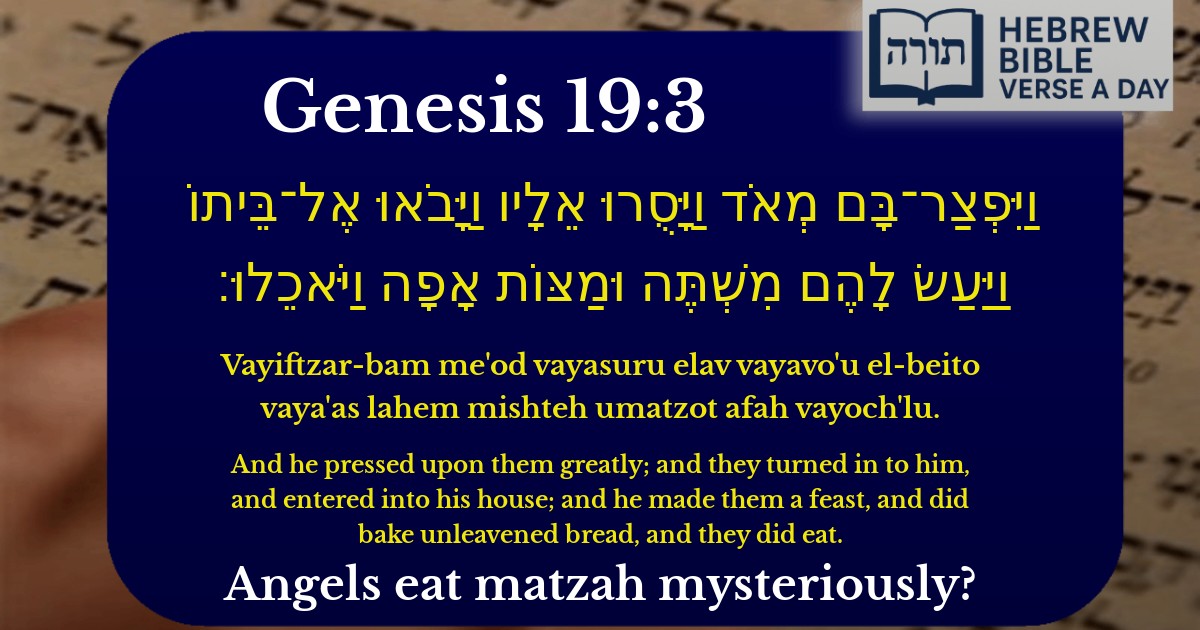Frequently Asked Questions
Q: Why did Lot insist so strongly that the angels come into his house?
A: Lot pressed the angels strongly to enter his home because he wanted to fulfill the mitzvah of hachnasat orchim (hospitality to guests), which is a fundamental value in Judaism. Rashi explains that Lot learned this trait from Avraham, who was known for his exceptional hospitality. Despite living in the wicked city of Sodom, Lot maintained this righteous behavior.
Q: Why did Lot serve unleavened bread (matzah) to the angels?
A: The Midrash (Bereishit Rabbah 50:2) explains that Lot served matzah because it was Pesach (Passover) time. This teaches that even in a place like Sodom, Lot kept track of the Jewish calendar and observed mitzvot. Additionally, matzah is quick to prepare, showing his eagerness to serve his guests promptly.
Q: What lesson can we learn from Lot's hospitality in this verse?
A: From Lot's actions, we learn the importance of hachnasat orchim (welcoming guests), even in difficult circumstances. The Talmud (Shabbat 127b) states that hospitality is greater than receiving the Divine Presence. Though Lot lived in sinful Sodom, he risked his safety to perform this mitzvah, showing that we must uphold righteousness regardless of our environment.
Q: Why does the Torah mention that Lot 'made them a feast'?
A: The detail about the feast emphasizes Lot's generosity and the importance of honoring guests properly. Rambam (Hilchot Avel 14:2) teaches that hosting guests is a form of imitating Hashem's kindness. By preparing a full meal (not just basic food), Lot demonstrated true hospitality, following the example of his uncle Avraham.
Q: How does this verse connect to the story of Pesach (Passover)?
A: The mention of matzah hints that this event occurred during Pesach. The Sages teach that Lot was saved from Sodom's destruction on Pesach, just as the Israelites were later redeemed from Egypt on Pesach. This shows a theme of divine salvation during this time. Additionally, the matzah symbolizes both haste (Lot's quick preparation) and humility, key themes of the holiday.


Context of the Verse
This verse (Bereshit 19:3) describes Lot's hospitality to the two angels who visited Sodom. Despite their initial reluctance, Lot insisted that they stay with him, prepared a feast, and served them matzot (unleavened bread). The narrative highlights Lot's righteousness in contrast to the wickedness of Sodom.
Lot's Insistence on Hospitality
Rashi explains that Lot "pressed upon them greatly" (וַיִּפְצַר־בָּם מְאֹד) because he feared for their safety if they remained in the public square of Sodom. The Midrash (Bereshit Rabbah 50:5) emphasizes that Lot learned the value of hospitality from Avraham, his uncle, and thus acted with urgency to protect his guests.
The Significance of Matzot
The verse states that Lot baked matzot (מַצּוֹת) for his guests. Ramban notes that matzah is prepared quickly, indicating Lot's haste to fulfill the mitzvah of hachnasat orchim (hospitality) without delay. Additionally, the Talmud (Pesachim 3a) suggests that righteous individuals avoid chametz (leavened bread) due to its association with arrogance (se'or), symbolizing Lot's rejection of Sodom's corrupt values.
Contrast with Sodom's Wickedness
The Midrash (Bereshit Rabbah 50:4) contrasts Lot's kindness with Sodom's cruelty, where hospitality was forbidden. By hosting guests, Lot risked his life, as the Sodomites punished such acts severely (see Bereshit 19:9). This underscores the moral divide between Lot and his surroundings.
Lessons in Hospitality